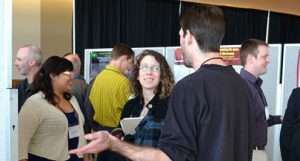Core Opportunities
Features of the Program
Trainees value our program for the career development, transdisciplinary science, and close mentorship is avails. The following are some of our major activities and professional development opportunities available to trainees throughout their WSU career.
- INTERNSHIPS: “Choose your own adventure” 2–3-month industry internships that are informed and catalyzed by program activities
- VALUE-ADDING COURSEWORK: Essential skill development, career awareness, and commercialization training in our Protein Biotechnology course
- MONTHLY PROFESSIONAL DEVELOPMENT MEETING: Trainee-centered professional development in monthly Forum meetings and committee project work
- ANNUAL BIOTECH SYMPOSIA: Exposure to outside speakers who bring diverse career and scientific perspectives to trainees and the larger community. Besides hearing formal presentations from these guests, trainees have the opportunity for informal contact at receptions and dinners in conjunction with the visits. The symposia are also an opportunity to present research to transdisciplinary audiences in a poster competition
- TRAVEL SUPPORT:
- Program organizes an annual trip to a regional biotech workforce conference (Life Science NW) in Seattle, supported by program and supplementary funds.
- Trainees also have access to travel funds to attend other scientific conferences
- ROTATIONS: Laboratory rotations (5-8 week trials in labs) in over 45+ labs with a diverse array of techniques and addressing problems in agricultural, chemical, environmental, and infectious disease science and engineering
- TRAINED MENTORS: Trainers work with the program to implement research-proven strategies for establishing safe, inclusive, and productive training environments. Faculty trainers participate “Faculty Forum” program to build connections and discuss mentorship topics out of CIMER’s “Entering Mentoring” curriculum.
- NETWORKING WITH A SUPPORTIVE COHORT: Attentive mentorship from program leaders, belonging to a cohort of diverse and engaged scientists, and additional financial supports.
Financial Support
Trainees in good standing will be supported by a combination of NIH, institutional and mentor-provided funds for their entire graduate career. This involves direct financial support equivalent to a research assistantship, waiver of out-of-state tuition and payment of in-state tuition. In general, the first two years involve support by institutionally supplemented NIH funds and subsequent years by funds from the mentor. Employment as a teaching assistant is typically limited to a specific teaching requirement of the trainee’s Ph.D. program or individual trainee interest.
